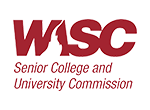
Post-Baccalaureate Certificate
in Remote Teaching, K-12
Courses start every Monday
Take the first step in your National University journey
200k+ Alumni Worldwide
Overview
As opportunities in the e-learning environment continue to grow, it’s important for teachers to understand the unique needs of remote classrooms and students, and the strategies and tools for creating the optimal e-learning experience.
In this certificate program, you’ll study various styles, technologies, and activities to facilitate e-learning, and how to educate at a distance when online access is either unavailable or unreliable. You’ll also examine how best to incorporate mobile devices into your remote teaching and learning.

The Western Association of Schools and Colleges (WASC) accredits public and private schools, colleges, and universities in the U.S.
Admission Requirements
A baccalaureate degree or higher from an accredited college or university.
Courses
For the Post-Baccalaureate certificate in Remote Teaching, K-12, you must complete four courses and 12 credit hours. The estimated time needed to complete this certificate is 9 months.
Course Details
Course Listings
This course provides an introduction to essential teaching and learning concepts for K-12 educators in remote learning environments. You’ll examine differences between the characteristics of face-to-face, hybrid, and remote learning contexts; explore and evaluate various educational technologies for use in the remote classroom; and develop instruction suitable for remote environments. You’ll also propose equitable solutions to overcome the challenges of remote learning for diverse student populations.
In this Master’s level course, you’ll be introduced to the strategies necessary to facilitate teaching and learning practices in the e-learning environment. You’ll also examine the development of effective online learning facilitation skills, such as accommodating various learning styles, conducting effective online class discussions, monitoring the progress of students, guiding collaborative online learning activities, and administering online assessment and evaluations.
In this course, you’ll explore K-12 education when the teachers, staff, and/or students have limited online access. You’ll examine factors that contribute to this limited online access. You’ll also consider how existing standards for classroom-based and online education can be interpreted for remote teaching and learning with limited online access. As you consider how to transform instructional activities for remote learning with limited access, you’ll also consider approaches to authentic assessment in remote circumstances. Finally, you’ll examine approaches to integrate social and emotional learning and evaluate the principles of diversity, equity, and inclusion in remote education.
In this course, you’ll receive an introduction to teaching and learning with the use of mobile devices. Studies will focus on the conceptual and theoretical foundations for implementing mobile devices into the curriculum, including exploration, examination, and evaluation of mobile technology and related processes and techniques in order to ensure their most effective use. In addition, you’ll explore the structural aspects, pedagogical issues, curriculum design, psychological and group dynamics, ethical and social issues, as well as the practical issues inherent in using mobile devices.
Learning Outcomes
Students earning the Post-Baccalaureate Certificate in Remote Teaching will learn to:
- Apply the concepts and practices of early childhood education
- Effectively communicate and conduct sound, open-minded research
- Address educational issues critically and reflectively
- Create solutions to problems based on knowledge, research, critical thinking skills, and collaboration
- Respect diverse cultures and backgrounds
- Demonstrate a commitment to the highest ethical and professional standards through accreditation
- Foster effective discussion of theoretical problems within the educational profession
- Nurture a commitment to life-long learning
Why Choose National University
- Four-Week Courses
- 75+ Degree Programs
- Online or On-Site
- Year-Round Enrollment
- Military Friendly
We’re proud to be a veteran-founded, San Diego-based nonprofit. Since 1971, our mission has been to provide accessible, achievable higher education to adult learners. Today, we educate students from across the U.S. and around the globe, with over 240,000 alumni worldwide.

“National University has impacted my career. You can immediately apply what you learn in class to your business.”
-Francisco R., Class of 2016
Program Disclosure
Successful completion and attainment of National University degrees do not lead to automatic or immediate licensure, employment, or certification in any state/country. The University cannot guarantee that any professional organization or business will accept a graduate’s application to sit for any certification, licensure, or related exam for the purpose of professional certification.
Program availability varies by state. Many disciplines, professions, and jobs require disclosure of an individual’s criminal history, and a variety of states require background checks to apply to, or be eligible for, certain certificates, registrations, and licenses. Existence of a criminal history may also subject an individual to denial of an initial application for a certificate, registration, or license and/or result in the revocation or suspension of an existing certificate, registration, or license. Requirements can vary by state, occupation, and/or licensing authority.
NU graduates will be subject to additional requirements on a program, certification/licensure, employment, and state-by-state basis that can include one or more of the following items: internships, practicum experience, additional coursework, exams, tests, drug testing, earning an additional degree, and/or other training/education requirements.
All prospective students are advised to review employment, certification, and/or licensure requirements in their state, and to contact the certification/licensing body of the state and/or country where they intend to obtain certification/licensure to verify that these courses/programs qualify in that state/country, prior to enrolling. Prospective students are also advised to regularly review the state’s/country’s policies and procedures relating to certification/licensure, as those policies are subject to change.
National University degrees do not guarantee employment or salary of any kind. Prospective students are strongly encouraged to review desired job positions to review degrees, education, and/or training required to apply for desired positions. Prospective students should monitor these positions as requirements, salary, and other relevant factors can change over time.